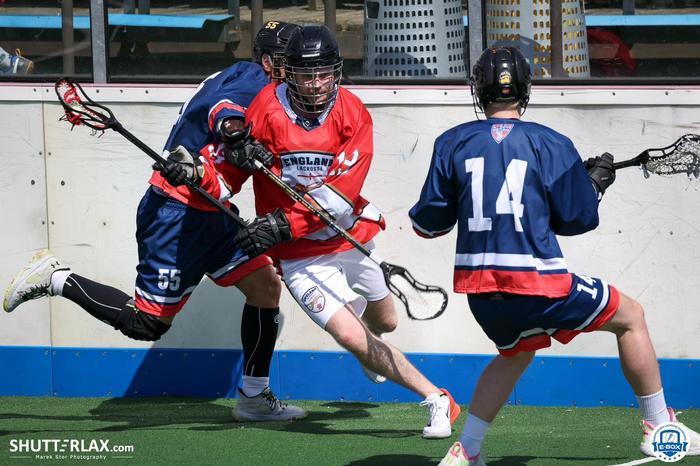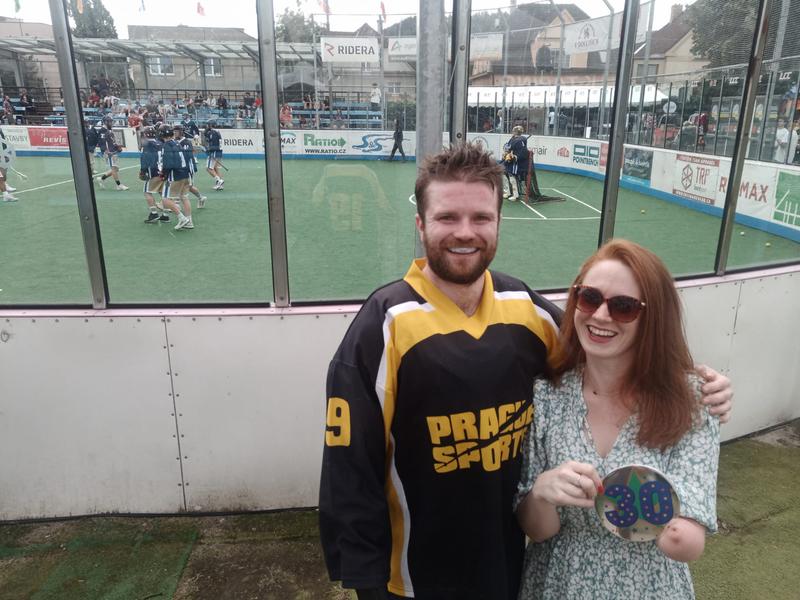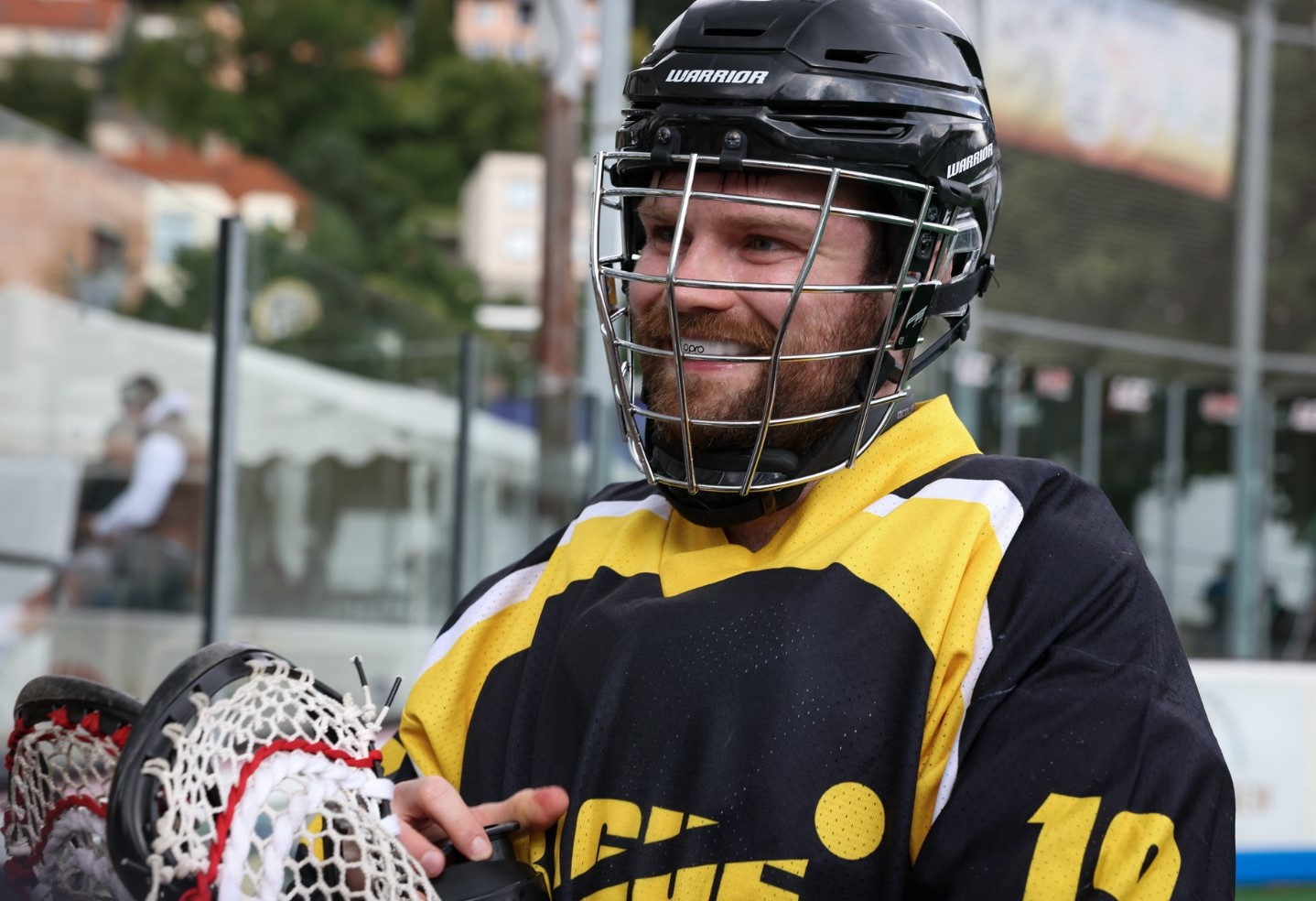Combining international lacrosse and orthopaedic training
By Callum Counihan
ST4 Trauma and Orthopaedics
South West London rotation (Kingston Hospital)
I am an ST4 on the South West London rotation currently working at Kingston Hospital doing an arthroplasty year and have recently dropped down to 80% LTFT. I balance this with playing lacrosse at a high level; I play premiership level field lacrosse in the UK, and last year was selected to represent England in Box Lacrosse.
I have been a competitive athlete for as long as I can remember - I love training, competing and being involved in high performing teams. In my younger years I was a keen rugby player and a reluctant (but successful) rower. Unfortunately, I had to give up rugby just as I started university because of health issues related to concussions. By pure chance and luck I was persuaded to try field lacrosse; a sport I’ve now been playing for the past ten years. Just over a year ago I branched out into box lacrosse, which is the field game’s rougher tougher cousin. It originates from Canada with very similar rules to ice hockey. I’ve taken to box lacrosse like a duck to water and represented England in April of last year, playing against Norway, Germany and Switzerland in the E-Box invitational tournament in Prague. I have subsequently had many fantastic opportunities, representing the South against the North of England, travelling to European tournaments and playing at the highest level of the domestic field game.

Like surgical training, high level sport is a huge time commitment which requires complete dedication (another similarity being I am passionate about both and would be incredibly reluctant to sideline either). While I endeavour to balance my surgical career with my sporting career, I don’t think a true balance exists; there will always be times when one or the other takes priority. Fortunately, as lacrosse is a purely amateur sport in the UK, training and matches take place in evenings and weekends. Although it does require a bit of work to organise my rota (and a sympathetic rota co-ordinator), with a bit of forward planning I can fully commit to both. For example, prior to the October rotation I sent out a wishlist of weekends that I wanted off for key England commitments. As nothing in life comes for free, in return I offered to work Christmas, New Year or any combination of the two. This has allowed me to attend everything I’ve needed to this year.
However, my experience has been that the only way to have significant commitments outside work, be they sporting or otherwise, is to ruthlessly prioritise them. It is impossible to have it all - and I am not under the illusion that my relationships with friends and family have gone unscathed. I have missed countless events and often end up swapping into working bank holiday weekends as they are the only time guaranteed to have no lacrosse. Fortunately colleagues usually bite your hand off if you offer to work Christmas in exchange for a seemingly random weekend in January.
Further, I am fortunate enough to have a partner that is not only generous with her time (spending countless weekends crossing the country to stand in cold arenas while I play/train), but also on the same page financially, which has allowed me to reduce my income by going LTFT. It also helps that she has at least a passing interest in lacrosse, as we ended up spending her 30th birthday at a tournament in Prague. Yes, I am well aware that I have a pretty great deal.

Perhaps the biggest challenge other than the above, is the near constant physical fatigue. While there are enough hours in the day to do everything that is required of an orthopaedic trainee and also a lacrosse player, there is very little wiggle room. I do everything I can to maximise sleep and recovery time, and I use my commute to the hospital in lieu of cardio training. I prepare all my meals ahead of time which are macro counted; I eat pretty much the same combination of veg, pasta and protein at every meal (which to some is as bleak as it sounds). I also have a very well equipped home gym to cut out travel time and ensure I can get lifting sessions in even if I’m working a long day or an on-call shift.
Even despite all this planning I’ve not been totally immune to burnout. While sport has always helped me manage stress in my life, prior to going part time I did start to feel as though the challenges commonly faced by surgeons (namely fatigue, burnout and compromised relationships) were being exacerbated by my lacrosse commitments. This became particularly acute as I became involved in the England set-up and I realised that going less than full time would be the way forward as otherwise something was going to give - most likely my health. With some trepidation I approached my TPD to discuss this and spent a good day agonising over the initial email. Any concern about suggesting this on my part were completely unwarranted however. I am very fortunate to have an incredibly supportive TPD who was fully pro reducing my work commitments to facilitate sport. Although I have only been LTFT for a few weeks I am already feeling the benefits.
Additionally high level sport comes with its own pressures; there is a need to continually perform and improve (not unlike surgical training). It is not enough to be good enough, and I am constantly fighting to justify my continued involvement in the England set-up. Every game I have played so far has been filmed and while this is great for my highlight reel it also allows me to dissect every mistake I have made (in slow motion and high definition). Like a lot of surgeons I am probably my own biggest critic and I have to work very hard to not just focus on the negatives. I am acutely aware that every game or training session may be my last either because of injury or being cut due to performance. Fortunately, this feels like a different stress to work, and for me it distracts from the challenges of work rather than adds to them.
On the whole lacrosse has an overwhelmingly positive impact on my mental health. As orthopaedic training and life as a junior doctor is hard (and is only getting more challenging), I have found having an outlet and a mental escape invaluable. When I am on the pitch or in the gym I am one-hundred percent focused on the task at hand, present in the moment and mentally away from work. This is helped by the physical nature of box lacrosse - it’s hard to think about anything else while someone is trying to do you real physical harm.
In conclusion, the answer to how to balance high level sporting commitments with orthopaedic training is not a simple one. They are in a way complementary - I believe the skills I develop playing in a high performing lacrosse team makes me a better colleague and surgeon (and vice versa). In some ways because of this, the stresses and strains and pressures of one compounds the stresses and strains from the other.

